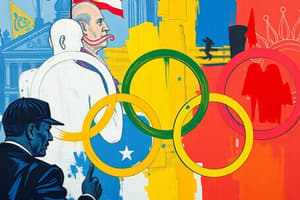Podcast
Questions and Answers
When was the University of Munich established?
When was the University of Munich established?
- 1854
- 1868
- 1900
- 1826 (correct)
Which river runs through Munich?
Which river runs through Munich?
- Isar (correct)
- Rhine
- Danube
- Elbe
Who founded Munich in the 8th century?
Who founded Munich in the 8th century?
- Wittelsbach Family
- Benedictine Monks (correct)
- Max Planck
- Louis IV
Which institution focuses on technology and engineering in Munich?
Which institution focuses on technology and engineering in Munich?
In what century did Munich undergo significant growth and development?
In what century did Munich undergo significant growth and development?
Which scientific research organization is headquartered in Munich?
Which scientific research organization is headquartered in Munich?
What is one of the music institutions found in Munich?
What is one of the music institutions found in Munich?
Which art gallery in Munich houses Renaissance German and Dutch paintings?
Which art gallery in Munich houses Renaissance German and Dutch paintings?
How has Munich, along with Germany, been attracting immigrants in recent years?
How has Munich, along with Germany, been attracting immigrants in recent years?
What contributes to Munich's vibrant cultural scene and economic success according to the text?
What contributes to Munich's vibrant cultural scene and economic success according to the text?
What is the average age of the population in Germany as of 2021?
What is the average age of the population in Germany as of 2021?
Flashcards are hidden until you start studying
Study Notes
Munich: A Cultural and Scientific Hub in Germany
Munich, also known as München, is the capital city of Bavaria, the largest state in Germany. It is the third largest city in the country, situated about 30 miles north of the Alps and along the Isar River. Munich has a rich history that dates back to the 8th century when it was founded by monks from the Benedictine monastery at Tegernsee. The city has since grown to become a cultural and scientific hub, with numerous educational and research institutions, as well as a vibrant arts scene.
History
Munich's history is closely tied to the Wittelsbach family, who ruled Bavaria from 1180. The city expanded under Louis IV, the first Wittelsbach to become Holy Roman Emperor, and continued to grow and prosper until the Thirty Years' War. In the 19th century, Munich underwent a significant period of growth and development, with the population increasing from 100,000 in 1854 to 500,000 by 1900.
Education and Research
Munich is home to several renowned institutions of higher learning, including the University of Munich, which was established in 1826. The Technical University of Munich, founded in 1868, is another prestigious institution that focuses on technology and engineering. The city is also the headquarters of the Max Planck Society for the Advancement of Science, Germany's official scientific research organization.
Arts and Culture
Munich has a rich cultural heritage and is known for its vibrant arts scene. The city is home to several music and theater institutions, including the Bavarian State Opera Company and the Munich Philharmonic Orchestra. It also houses a variety of museums and art galleries, such as the Alte Pinakothek, which contains a collection of Renaissance-era German and Dutch paintings and Flemish Baroque paintings.
Immigration and Diversity
Munich, like the rest of Germany, has experienced a significant increase in immigration in recent years, with a particular focus on attracting highly skilled individuals in the fields of science, technology, engineering, and mathematics. As of 2021, 83.2 million people are living in Germany, averaging at 44.7 years of age. The city's diverse population contributes to its vibrant cultural scene and economic success, as immigrants often bring new perspectives and ideas that help fuel innovation and growth.
Studying That Suits You
Use AI to generate personalized quizzes and flashcards to suit your learning preferences.



